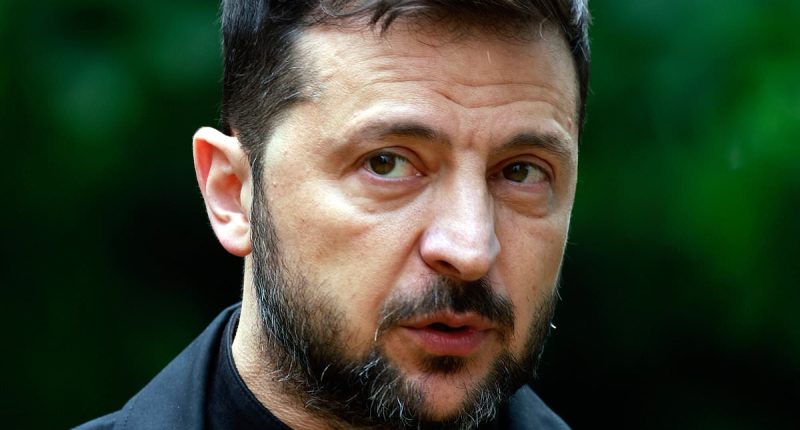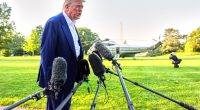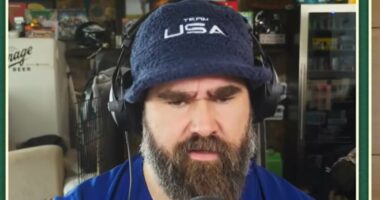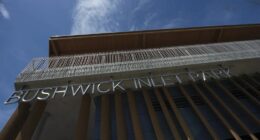Share this @internewscast.com
Volodymyr Zelensky warned that Vladimir Putin could attack a NATO country within the next five years, as he criticised the alliance for a slow spending ramp up.
Speaking to Sky News about the proposed NATO spending target of 5 percent of GDP by 2035, the Ukrainian leader said: ‘In my view, this is slow because we believe that starting from 2030 Putin can have significantly greater capabilities.’
Zelensky said that although Putin’s soldiers ‘are all getting annihilated and wiped out at the battlefield’ and that the Russian leader ‘needs a pause’, he said ’10 years is a very long time.
‘He will have a new army ready [by then].’
Zelensky’s remarks come after NATO members agreed on Sunday to a big increase in their defence spending target to 5 percent of GDP, as demanded by US President Donald Trump.
The UK was among the 32 member countries to agree to the goal, with Prime Minister Keir Starmer vowing to commit Britain to spending 3.5 percent of GDP on core defence spending, plus a further 1.5 per cent on security-related domestic infrastructure.
Starmer’s pledge came as he welcomed Zelensky to Downing Street over the weekend ahead of the NATO summit on Tuesday.
Sir Keir also announced plans for a new agreement with Ukraine.

Volodymyr Zelensky warned that Vladimir Putin could attack a NATO country within the next five years. Pictured: krainian President Volodymyr Zelensky speaks during a meeting with British prime minister at Downing Street, London, Britain, 23 June 2025

Zelensky’s remarks come after NATO members agreed on Sunday to a big increase in their defence spending target to 5 percent of GDP. Pictured: Russia’s President Vladimir Putin meets with Iranian Foreign Minister at the Kremlin in Moscow on June 23, 2025

It comes amid reports that Zelensky and US President Donald Trump are set to meet on Wednesday
‘I’m really proud that this afternoon we are able to announce an industrial military co-production agreement, the first of its kind so far as Ukraine and the UK are concerned, which will be a massive step forward now in the contribution that we can continue to make, and is really a symbol of not only our joint work in this conflict, but the 100-year agreement that we’ve put in place’, the prime minister said.
It also comes as the Ukrainian leader and Trump are set to meet on Wednesday on the sidelines of the NATO summit in The Hague, a senior source in the Ukrainian presidency told AFP.
The war-time leader has been a central figure at recent summits but given his fractious relationship with Trump, Zelensky has not been invited to the main working session with NATO members.
‘The teams are finalising the details’ of the meeting, the source told AFP, adding that the talks were scheduled for the ‘early afternoon’ in the Netherlands.
The source added that the discussion would focus on Ukraine’s ‘purchase of a defence package, a large part of which consists of air defence systems’.
The leaders would also discuss more ‘sanctions against Russia, and a price cap on oil’, the source added.
Ukraine and its allies have sought to lower an existing oil cap imposed on Russia after it invaded Ukraine more than three years ago, from $60 to $45, to dent the Kremlin war chest.
Trump so far has frustrated Western allies by refusing to impose new sanctions on Russia despite President Vladimir Putin’s refusal to agree to a Ukraine ceasefire.
Trump and his NATO counterparts are due to gather today for a summit that could unite the world’s biggest security organisation around a new defense spending pledge or widen divisions among the 32 allies.

Britain’s Prime Minister Keir Starmer (L) shakes hands with Ukraine’s President Volodymyr Zelensky (R) at 10 Downing Street, central London, on June 23, 2025 for a bilateral meeting on the eve of the NATO Summit

Trump and his NATO counterparts are due to gather today for a summit in The Hague that could unite the world’s biggest security organisation. Pictured: Zelensky speaks next to Netherlands’ outgoing Prime Minister Dick Schoof upon his arrival at the Catshuis official residence for a bilateral meeting on the sidelines of the two-day NATO summit
Last week, NATO Secretary-General Mark Rutte was optimistic the European members and Canada would commit to invest at least as much of their economic growth on defense as the United States does for the first time.
Then Spain rejected the new NATO target for each country to spend 5 percent of its gross domestic product on defense needs, calling it ‘unreasonable.’ Trump also insists on that figure. The alliance operates on a consensus that requires the backing of all 32 members.
The following day, Trump said the U.S. should not have to respect the goal.
‘I don’t think we should, but I think they should,’ he said. Trump lashed out at Prime Minister Pedro Sánchez’s government, saying: ‘NATO is going to have to deal with Spain. Spain’s been a very low payer.’ He also criticized Canada as ‘a low payer.’
Spain was the lowest spender in the alliance last year, directing less than 2% of its GDP on defense expenditure, while Canada was spending 1.45%, according to NATO figures.
The two-day summit in The Hague involves an informal dinner Tuesday and one working session Wednesday morning.
A very short summit statement has been drafted to ensure the meeting is not derailed by fights over details and wording.
Founded in 1949, the North Atlantic Treaty Organization was formed by 12 nations to counter the threat to security in Europe posed by the Soviet Union during the Cold War, notably via a strong U.S. presence on the continent.
NATO’s ranks have grown to 32 countries since the Washington Treaty was signed 75 years ago. Sweden joined last year, worried by an increasingly aggressive Russia.









